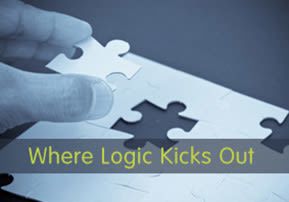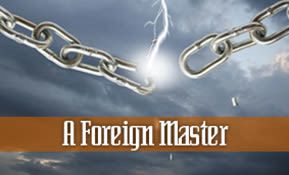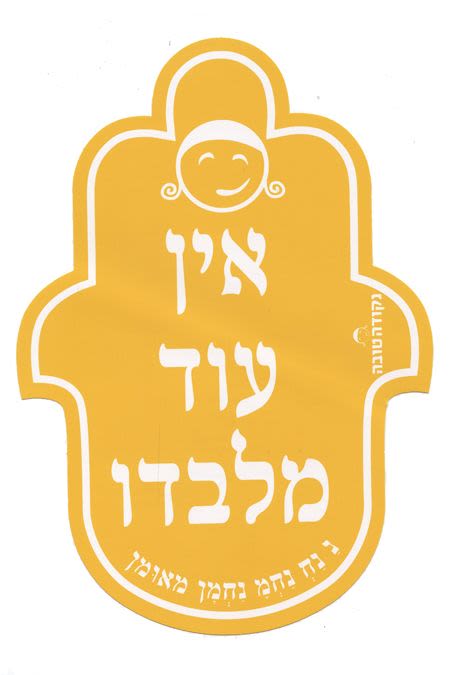
Where Logic Kicks Out
There will always be a limit to the extent where we can understand what Hashem does. But where intellect, logic and understanding kick out, emuna must kick in...

Translated by Rabbi Lazer Brody
There will always be a limit to the extent where we can understand what Hashem does. But where intellect, logic and understanding kick out, emuna must kick in. One who thinks or hopes to understand Hashem will not attain emuna.
Not even Moses could understand Hashem. When Moses asked Hashem to show him the secret of how He works, Hashem answered him, “You cannot see My Face.” In other words, you can never understand how I  work on an a priori basis. You’ll only be able to understand what I do in retrospect. This is the intrinsic meaning of what Hashem says, “You can see Me from the back, but my face cannot be seen” (Exodus 33:23).
work on an a priori basis. You’ll only be able to understand what I do in retrospect. This is the intrinsic meaning of what Hashem says, “You can see Me from the back, but my face cannot be seen” (Exodus 33:23).
Never forget that at the time of a test, a person cannot really know or understand that it is all for the good! If he understood that it is good, then there wouldn’t be a test. Every test and choice is only when according to a person’s intellect the situation seems bad. The level of knowing from the outset that everything is good is a level that no human being can attain, because understanding the situation with such clarity nullifies free choice.
Therefore, it doesn’t matter who a person is – whether a simple shoe shiner or our forefather Jacob – no person in this material world with tests of faith right and left can know from the outset that everything is for the good. Even if the person is Moses or a Rebbe Akiva! For every person, a trying situation appears to be bad at the time of the challenge. We cope by strengthening our emuna – even without no understanding – that it’s all for the good.
During a difficult challenge, don’t try to understand what’s happening to you, for you won’t draw strength and encouragement, only frustration. So, when a situation looks completely bad from a logical perspective, emuna will enable you not only to cope, but to attain tremendous personal growth as well.
Through eyes of emuna, however, everything is good! We don’t necessarily understand how it’s all for the good, but we believe that it’s all good.
Don’t think that great prophets and tzaddikim on higher spiritual levels than we are have an easy time in coping with their tribulations. They suffer excruciating tests of faith in accordance with their lofty spiritual level; they too cannot see that their suffering is for the good. Indeed, with their intellect it seems that it’s all NOT good! But they have emuna that everything is for the very best.
In challenging times, if a person thinks that in order to believe that his suffering is all for the good, he has to understand intellectually how it’s good, then he’s in for a major disappointment. Such a person sometimes tries to convince himself that tribulation at hand is all for the good. But then he sees his wife, his parents, or his neighbors convince him in unison that his ideas are skewed. Since he lacks genuine and steadfast emuna, he loses resolve, becomes confused, and begins to question everything.
A person must first understand that he will not be able to see from the outset how his tribulations are good, otherwise they wouldn’t be tribulations. For example, an Olympic boxer understands that he’ll be hit during training; he doesn’t complain when the coach catches him off guard and punches him, for he knows this is part of becoming a champion. But, if a person walking down the street gets punched for no apparent reason, he won’t be able to know how and why this is for his ultimate benefit. That’s where complete emuna comes in.
Complete emuna in Hashem means that we believe without any doubt that He directs and observes each of us individually with exacting precision, and He sees what we don’t see. In short, complete emuna gives us the peace of mind that Hashem is doing everything for our ultimate good, regardless of the fact that we don’t see how.
Therefore a person should tell himself, “I understand that suffering is seemingly very bad. I even feel tremendous pain. My tribulations are apparently unbearable, but I believe that they’re all for the best, despite the fact that I don’t see how…”
There’s is a song that we have sung for years now: “I don’t understand a thing, I don’t understand a thing, just believe, just believe that all is for the good.” The intellectual understanding of difficulty is what we are referring to by, “I don’t understand a thing.” When it seems really bad, “I don’t understand a thing.” I can believe that it is for the good, however.
Whenever on encounters a test of faith, he should not expect to understand how even the smallest detail of the test is for his good. He should lean on his emuna only, for this way, he’ll be able to give thanks to Hashem in any situation. Gratitude mitigates all harsh judgments and invokes miraculous salvations. May you all see miracles and blessings in your life always, amen.












12/27/2010
emuna and bitachon THANKS R SHALOM AND R LAZER. FOR A WONDERFUL AND INSPIRING LESSON THAT MAKES UP EVERYONE'S LIVES TODAY AND FOR GIVING THE HELP EACH PERSON NEEDS, ONE SPIRITUAL PATH FOR ALL PROBLEMS.
12/27/2010
THANKS R SHALOM AND R LAZER. FOR A WONDERFUL AND INSPIRING LESSON THAT MAKES UP EVERYONE'S LIVES TODAY AND FOR GIVING THE HELP EACH PERSON NEEDS, ONE SPIRITUAL PATH FOR ALL PROBLEMS.